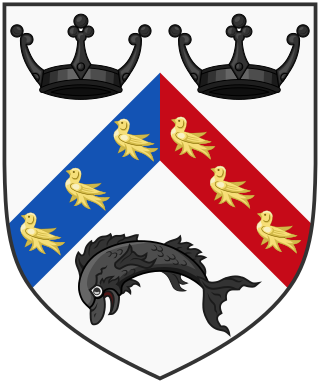
The University of Sussex is a public research university located in Falmer, East Sussex, England. It lies mostly within the city boundaries of Brighton and Hove. Its large campus site is surrounded by the South Downs National Park, and provides convenient access to central Brighton 5.5 kilometres (3.4 mi) away. The university received its royal charter in August 1961, the first of the plate glass university generation.

Brighton is a seaside resort and one of the two main areas of the city of Brighton and Hove in the county of East Sussex, England. It is located 47 miles (76 km) south of London. Archaeological evidence of settlement in the area dates back to the Bronze Age, Roman and Anglo-Saxon periods. The ancient settlement of "Brighthelmstone" was documented in the Domesday Book (1086). The town's importance grew in the Middle Ages as the Old Town developed, but it languished in the early modern period, affected by foreign attacks, storms, a suffering economy and a declining population. Brighton began to attract more visitors following improved road transport to London and becoming a boarding point for boats travelling to France. The town also developed in popularity as a health resort for sea bathing as a purported cure for illnesses.
The University of Brighton is a public university based on four campuses in Brighton and Eastbourne on the south coast of England. Its roots can be traced back to 1858 when the Brighton School of Art was opened in the Royal Pavilion. It achieved university status in 1992.

Silicon Fen also known as the Cambridge Cluster, is the name given to the region around Cambridge, England, which is home to a large number of high tech businesses focused on software, electronics, and biotechnology, including Arm and AstraZeneca.

Silicon Glen is the nickname given to the high tech sector of Scotland, the name inspired by Silicon Valley in California. It is applied to the Central Belt triangle between Dundee, Inverclyde and Edinburgh, which includes Fife, Glasgow and Stirling; although electronics facilities outside this area may also be included in the term. The term has been in use since the 1980s. It does not technically represent a glen as it covers a much wider area than just one valley.

East Sussex College or East Sussex College Group is the largest higher education college in East Sussex, providing education and training from foundation to degree level. The college educates almost half of the county's young people and over 8,000 adults each year at campuses in Lewes, Eastbourne, Hastings and Newhaven, and in the workplace.
A business cluster is a geographic concentration of interconnected businesses, suppliers, and associated institutions in a particular field. Clusters are considered to increase the productivity with which companies can compete, nationally and globally. Accounting is a part of the business cluster. In urban studies, the term agglomeration is used. Clusters are also important aspects of strategic management.

Silicon Wadi is a region in Israel that serves as one of the global centres for advanced technology. It spans the Israeli coastal plain, and is cited as among the reasons why the country has become known as the world's "start-up nation". The highest concentrations of high-tech industry in the region can be found around Tel Aviv, including small clusters around the cities of Raʽanana, Petah Tikva, Herzliya, Netanya, Rehovot, and Ness Ziona. Additional clusters of high-tech industry can be found in Haifa and Caesarea. More recent high-tech establishments have been raised in cities such as Jerusalem and Beersheba, in towns such as Yokneam Illit, and in Airport City.
Silicon Gorge is a region in South West England in which several high-tech and research companies are based, specifically the triangle of Bristol, Swindon and Gloucester. It was ranked fifth of such areas in Europe in 2002, and is named after the Avon Gorge.

Coworking is an arrangement in which workers for different companies share an office space. It allows cost savings and convenience through the use of common infrastructures, such as equipment, utilities and receptionist and custodial services, and in some cases refreshments and parcel acceptance services. It is attractive to independent contractors, independent scientists, remote workers, digital nomads, and people who travel frequently. Additionally, coworking helps workers avoid the feeling of social isolation they may experience while remote working or traveling and eliminate distractions in home office. Most coworking spaces charge membership dues. Major companies that provide coworking space and serviced offices include WeWork, IWG plc, Industrious, and Impact Hub.

Science Policy Research Unit (SPRU) is a research centre based at University of Sussex in Falmer, near Brighton, UK. It focuses on long term transformative change, science policy and innovation across different sectors, societies and structures. It was one of the first interdisciplinary research centres in the field of science and technology policy and at the forefront of the development of innovation as an academic discipline. Alongside internationally renowned research, SPRU also offers a range of MSc courses, as well as PhD research degrees.

Anna Dumitriu is a pioneering visual artist based in Brighton, England, specialising in BioArt. Her installations, interventions and performances use digital, biological and traditional media including bacteria, digital technology and craft techniques, working with diverse audiences.

East London Tech City is a technology cluster of high-tech companies located in East London, United Kingdom. Its main area lies broadly between St Luke's and Hackney Road, with an accelerator space for spinout companies at the Queen Elizabeth Olympic Park.
Jonathan Philip Pryce Goodwin is a British banker and investor. He is partner, head of Merchant Banking at Alvarium Investments. His appointment followed the merger in March 2019 of Lepe Partners, the merchant bank he co-founded in 2011, with Alvarium which works across North America, Europe and Asia Pacific, supervising $15bn+ of assets. With Brent Hoberman, Goodwin also co-founded Founders Forum, a network of digital entrepreneurs, corporate CEOs and senior investors.
The United Kingdom has a diverse cyber security community, interconnected in a complex network.
Innovation districts are urban geographies of innovation where R&D strong institutions, companies, and other private actors develop integrated strategies and solutions to develop thriving innovation ecosystems–areas that attract entrepreneurs, startups, and business incubators. Unlike science parks, innovation districts are physically compact, leverage density and high levels of accessibility, and provide a “mash up” of activities including housing, office, and neighborhood-serving amenities. Districts signify the collapse back of innovation into cities and is increasingly used as a way to revitalize the economies of cities and their broader regions. As of 2019, there are more than 100 districts worldwide.
Catapult centres are a network of nine organisations set up by Innovate UK in the United Kingdom, to promote research and development (R&D) and to exploit market opportunities. Catapult centres promote R&D and innovation through business-led collaboration between scientists, academics, engineers, entrepreneurs, industry leaders and Government. They receive grants from public funds but are also expected to seek commercial funding. The first tranche of Catapults were established in 2011.
The Creative Industries Federation (2014-2021) was a national organisation for all the UK's creative industries, cultural education and arts. It advocated for the sector, aiming to ensure that the creative industries were central to political, economic and social decision-making.
Digital Catapult is the UK innovation agency for advanced digital technology, developed in conjunction with Innovate UK as part of the Catapult centres. Digital Catapult works with startups, industries, investors, public sector and academia to accelerates the adoption of new and emerging technologies, with the aim of driving regional, national and international growth for UK businesses across the economy.










